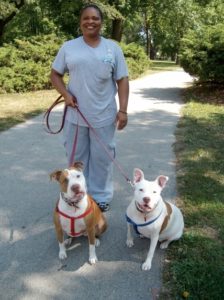URBAN DOGS; GOOD NEIGHBORS VIDEO
HONOLULU PET POLICIES
HONOLULU PET POLICIES
LOOKING FOR PET FRIENDLY buildings in Honolulu? See Kristian Nielsen’s comprehensive LIST (founder of Honolulu Hi 5.)
HELP FOR CONDO AND APARTMENT DOG OWNERS. I have been training dogs and their owners since 1982 and, as an urban dweller myself, I have personal interest in resolving urban dog issues. If you are dealing with dog behavior issues or, if you are a member of a condo board that is dealing with pet owner issues, I can help. This is a short list of typical concerns:
- Socialization (growling, biting, fear, etc.)
- Transitioning from rural or suburban locations to an urban environment
- House breaking (inappropriate soiling or litter box training)
- Over-barking and excitability
PLEASE CALL ON ME AS A RESOURCE ANYTIME. I can be reached by email ([email protected]) or phone (ph/tx 414-289-7785).
CITY DOG CHALLENGES
CITY DOG CHALLENGES
EXCERPTED from Hip Ideas For Hyper Dogs by Amy Ammen and Kitty Foth

City Dogs
CITY DWELLERS FACE A NUMBER OF UNIQUE CHALLENGES in raising hyper dogs. Perhaps the most obvious is the sheer volume of everything – people, dogs, cats, traffic, noises, smells, stairs, elevators, bikes, wheelchairs, towering structures, metal-girded holes in the pavement, flag-festooned festivals and over-imbibing partiers, and not a whole lot of room to burn off their energy.
ON THE ONE HAND, you want your hyper dog to take kindly to all these people, places and things, so she can enjoy the mental stimulation and emotional highs of interacting with lots of different people and dogs. On the other hand, you want her to have a fear of some of them – especially the exteriors of cars, vans and trucks on the move. And above all you need her to have a healthy respect for you and whatever commands you might choose to give her.
IN ALL CASES, THE SOLUTION is solid obedience training (pages 33 – 74).

City Dogs: Pit Bulls
FOR ME AND MY HYPER DOGS, every step of every outing is a chance to practice obedience. When I am unlocking my bike or taking out garbage, carrying in groceries or lugging around laundry, we are always practicing tasks like sit-stays and heeling on a loose leash. And in fact one of the best things about city living is the wealth of distractions that are readily available – distractions that can be used to teach our hyper dogs to obey us no matter what temptations may arise. Training amidst distractions is absolutely crucial to achieving one-command control; and if you live in the city, you won’t have to go far to find them.
THERE ARE DRAWBACKS to owning a dog of any temperament in the city, of course. To deal with them, you’ll need to be vigilant. For instance:
- You have to be on the alert at all times, keeping an eye out for everything from traffic to creatures, human and otherwise, who would do your dog harm.
- You have to make sure your dog is properly socialized, so she’s never a threat to others.
- For your own safety when you’re carrying loads up and down stairs, you need her to walk politely on a slack lead.
- Because of the volume of sensory data bombarding us in urban areas, phobias may be slightly more prevalent in city dogs.
STILL, A HYPER DOG — one who’s eager to share your urban experiences — is the perfect companion for a city dweller.
SOLUTIONS IN A NEW YORK MINUTE
SOLUTIONS IN A “NEW YORK MINUTE”
DOG OWNERS have a wide variety of behavior concerns, so you may be wondering if Amy Ammen can help. The answer is YES! I offer customized private consultations, workshops, and group classes. I specialize in solving an extensive array of behavior problems including:
- separation anxiety
- aggression (all forms including dog-to-dog, dominance, and/or fear-based)
- house soiling and marking
- social problems (with guests, family members and/or in public)
- destructiveness
- excessive barking, whining or howling
ALTHOUGH THESE are the most common issues, frequently I work with more unusual cases such as self-mutilation, phobias of all types, and chronic submissive urination.
THE GOAL is provide the simplest, most effective techniques to help your dog adapt to urban life ASAP.
SO CONTACT ME ANYTIME you’d like to discuss a special situation regarding your dog or to arrange a private consultation.
Sincerely,
Amy Ammen
[email protected] or phone/text 414-289-7785
DON’T LET FIDO’S PHOBIAS SOUR CELEBRATIONS
DON’T LET FIDO’S PHOBIAS SOUR CELEBRATIONS

City Dogs
IF YOUR DOG is traumatized by fireworks or any of the other noises – from sirens to motorcycles, screaming children to chain saws – take heart: There is a solution, according to Amy Ammen, nationally known dog-behavior expert and author of Hip Ideas for Hyper Dogs (Wiley).
“THE SOLUTION is counter-intuitive,” said Ammen, “and it stems from people trying to do the right thing – and failing. The fact is, an owner’s best instinct may actually be killing his canine’s confidence.”
THE PRIMARY PROBLEM Ammen encounters in working with fearful dogs is clients coddling and reassuring the animals in stressful situations. “The result of such coddling is just the opposite. Instead of calming the dog, it actually rewards him for fearful behavior and entrenches the fear.”
FORTUNATELY, giving such a dog the courage he needs to face such traumas is usually easier than one might think, she said. Here’s the scoop.
“FIRST, REMAIN CALM, relaxed, and unemotional even in the face of this incredible danger that he’s detected. Second, use basic obedience commands to get him focused on you instead of on the source of his fear. And third, distract him with happy talk and treats.”
AMMEN PROVIDED THESE TIPS for overcoming canine phobias:
- Do not give your dog attention when he is acting freaked out.
- Do give him a command – and enforce it.
- Do keep your dog on a short leash, and don’t allow him to scurry about.
- Do not allow people to rush up to your dog if he’s in an anxious state; do ask them to ignore him.
WHEN YOU KNOW that you’ll be facing a potentially frightening situation, you can prepare for it ahead of time, Ammen said. “Take him to class, establish basic skills, intentionally induce anxiety-provoking situations, and apply the skills you’ve learned together.”
For additional strategies for squelching phobias, Ammen suggests consulting Hip Ideas for Hyper Dogs.
URBAN DOGS – UBER AWESOME!
URBAN DOGS – UBER AWESOME!
MY FIRST DOZEN-PLUS DOGS, and myself, were born and raised in the rural Midwest. That all changed in 1990 when I moved to downtown Milwaukee. I am a dog trainer by profession* and one day made an abrupt, and frighting, decision to kiss the country goodbye. I packed up the dogs and moved to Warren Avenue. Although I was attracted by the city, I was apprehensive about how my dogs, despite being trained and socialized, would acclimate. Would stray dogs endanger them on walks? Would they be unsettled by booming fireworks throughout the festival season? Would the stress of having less opportunity to stretch their legs for a good run induce neurosis?
ALMOST TWO DECADES LATER, it appears my dogs have never been happier. Of course I own less dogs than I did in the country (two at a time, to be precise), but the city provides so much amusement — the parks, the people, the pets, the parades, the outdoor pubs — that in 1992 I moved closer to Wisconsin Avenue.
AS A DOG TRAINER, I am happy I’ve experienced the changes and pleasure of both rural and urban environments and know the keys to idyllic dog ownership in diverse communities. Here’s my advice for city folk:
- Keep your dog on a short leash and walk at a brisk pace until you get to a play or potty area.\
- Don’t let your dog sniff or invade another dog’s space (unless he’s familiar and you have permission). Even when approaching a familiar playmate, teach your dog to wait for an invitation rather than rocketing impulsively to his friend.
- Be cautious when your dog enters or exits your vehicle or the elevator. Keep him on a short leash, get him comfortably out of the traffic pattern, and teach him to sit and to remain in position until released.
- Think barking is your dog’s god-given right? Think again. Barking increases anxiety in your dog and promotes bad neighbor relations. Curb ALL barking on walks and barking indoors when he looks out a window or hears ordinary noise or workman. Not only will your dog be calmer, he’ll become a superior watchdog for those rare occasions you really do need him to take your side.
- Pick-up after your dog. Clean-up after your dog. Scoop the poop. Tote the turds. Dispose of the dumps. It’s P.C. to be responsible for your dog’s feces. If you ignore this, you tarnish every model dog owner’s reputation — and we will seek you out and shame you. Pick-up and be proud!
ALTHOUGH THE OPPORTUNITIES TO SOCIALIZE ABOUND, be respectful. Keep city dogs on short leash when on walks, dining at a sidewalk cafe, passing dogs, people and children, and entering or exiting doorways. Even though this is your beloved dog, it is unrealistic to expect others to share your fondness. To be sure, dog lovers abound in the city. Still, the best way to ensure your pet is accepted, or at least tolerated, in your new community is to showcase good manners — yours and his.
ARE YOUR CITY DOGS having trouble adjusting? Call me to arrange a private in-home session, get puppy, basic, and small dog class information, or DITY with my books and DVDs. Phone/text 414-289-7785 or email [email protected] for details.
*Amy Ammen, dog expert, director of Amiable Dog Training, author of six books including the Everything Puppy Book and the Everything Dog Book, and agent for Able the Dancing Chihuahua.
Contact Amy
Have a question? Please use this form to contact me about your goals, concerns, pertinent details, physical limitations, dog’s background and other topics.
Ready to Enroll?
Visit my services page and enroll in the group class, private lesson or workshop you’d like to attend. I will contact you upon enrollment and provide additional details.
